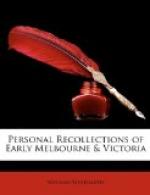He and I were on opposite sides of the political hedge, at least in the times when we were together in public life, both in Sydney and Melbourne, during the pre-constitutional era. He belonged, almost beyond any others—the exceptions being perhaps limited to William Forlong and my friend A.R. Cruikshank—to the anti-popular and pro-squatting party; although, subsequently, when there was the “fact accomplished,” and no help for it, he accepted “fully and cheerfully,” as his election addresses put it, the reigning democratic platform. But he was not unkindly withal, and he helped my comparative legislative inexperience at Sydney, when we were both there to represent Melbourne and Port Phillip. He had done me a great favour also in making himself most serviceable with the German immigration which I had started from Hamburg in 1849. He was quite a German scholar, having finished his education at Carlsruhe, a name which he transferred to his pastoral station in the Port Phillip District.
Ebden, like most others in it, did not bring much out from the allotment mob. When returned afterwards to represent the district along with me in Sydney, I heard that a draft of cattle from the station was needed for expenses. These were still the reactionary times of such small things for all of us. But in after years he went on and prospered, and he left behind him what might have been called a large fortune in any place where there were not a W.J.T. Clarke and a Henry Miller, and perhaps some few others besides, in the rival category.
EDWARD WILSON, CHIEF PROPRIETOR OF “THE ARGUS,” “THE TIMES” OF THE SOUTH.
“The good I stand on is my truth and honesty;
I fear nothing
What can be said against me.
—Henry VIII.
I was long and intimately acquainted with Wilson. He was a man of high qualities and noble longings, and scorned meanness of all kinds; and he had, like his predecessor Kerr, some good and pungent literary pretensions, although he could not be placed on a level with Kerr while the latter enjoyed adequate health. But, on the other hand, he greatly marred his influence by what might be called impetuous intemperateness in his early press career. Indeed, “The Argus”, in its later stages, must needs emerge, as in fact it did, from its chief owner’s editing,




